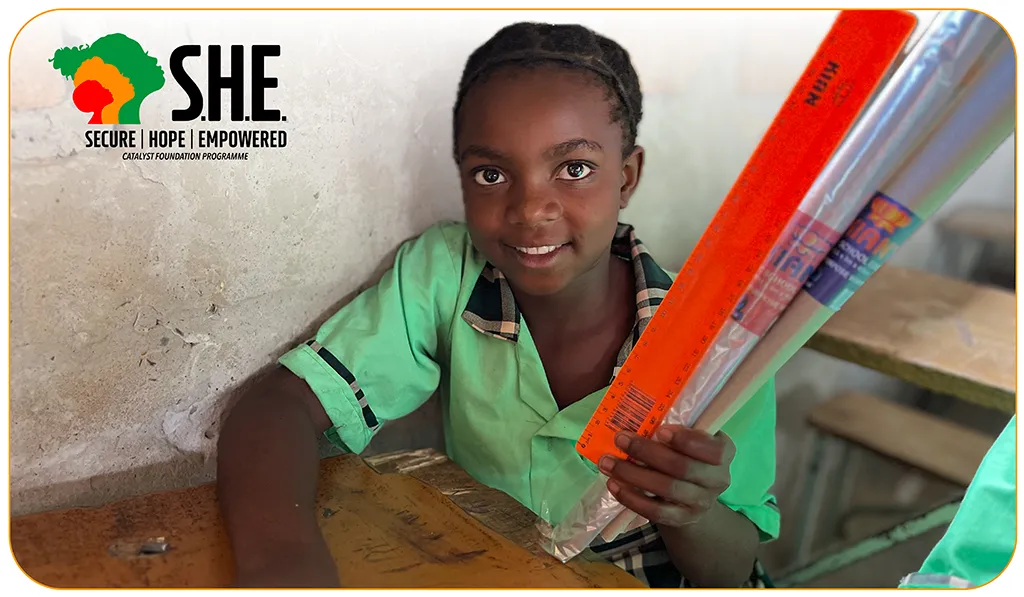In a world that seems to move with Wi-Fi, it can feel like a disadvantage when you don’t have a computer or an internet connection. More so in marginalised communities in developing countries such as Zimbabwe and Zambia, it can feel pretty hopeless not to have access to the knowledge that everyone else does. Most study guides are all about apps and online quizzes. But what if we told you that the secret to becoming a top student doesn’t lie in a signal, but in the power of your own imagination and community?
At Catalyst Foundation, through our S.H.E. Programme, we’ve seen first-hand the incredible ingenuity of students in marginalised communities. They don’t just overcome challenges; they create new, powerful ways to learn. This blog post is a celebration of that resilience. Forget the gadgets; we’re giving you ten fun, unconventional study tips that will make you a superstar in the classroom and beyond.
Get ready to transform your study habits and get everyone around you in on the action!
Experts say one of the best ways to de-stress is to get up and move! And that’s exactly what you need to do when stuck on a tricky concept. Walk around while you recite your notes out loud. You can act out a historical event, or even turn a science lesson into a song or a dance. Make it fun, engage your body, and you will see how your brain retains information more effectively.
Table of Contents
1. The Human Search Engine
Your parents, grandparents, and elders are a wealth of knowledge! Surprise, surprise, most of them were all born before Google and thus have aeons of knowledge. Turn history homework, even math homework, into a conversation with them about what life was like and how they used to do things. Turn studying into quality family time. We learn more and retain more when there’s an element of fun involved.
2. The ‘Teaching a Friend’ Method
The best way to learn something is to teach it to someone else. Find a study buddy or a younger sibling and explain a difficult concept to them. You’ll be surprised at how much more you understand when you have to put it into simple words. This is not only great for retention, but it also boosts your confidence and helps you learn a new skill whilst helping a fellow student.
3. The ‘Body in Motion’ Technique
Experts say one of the best ways to de-stress is to get up and move! And that’s exactly what you need to do when stuck on a tricky concept. Walk around while you recite your notes out loud. You can act out a historical event, or even turn a science lesson into a song or a dance. Make it fun, engage your body, and you will see how your brain retains information more effectively.
4. The ‘Flashcard Fun’ Challenge
Who says flashcards need to be boring and super serious? Grab some scrap paper and make your own. Write questions on one side and answers on the other. Challenge your friends to a quick-fire round, where the winner gets bragging rights. At Catalyst Foundation, we provide stationery and school supplies to our S.H.E. beneficiaries, ensuring they always have the tools for this fun challenge.
5. The ‘Wall of Wisdom’
Find a blank wall in your room or a common area and turn it into your personal billboard. Use a large sheet of paper, or pin or stick up your notes. Use different coloured pens to highlight key points, draw mind maps, or sketch diagrams. Studies show that the more colourful and intentional you are about studying certain things through art and making them your own, the easier it is to connect ideas and get a better scope of the bigger picture and concept.
6. The ‘Power of Sound’
You don’t need an app to record your voice. Use your voice to record notes in your head. Read your notes out loud and try to remember what you said. Recite a poem, make it fun, do it in a singsong manner or make up mnemonic devices. Repeat these to yourself even whilst doing chores and helping around the house. Hearing it out loud, even from yourself, helps you memorise it faster. As we all know with music, once it’s stuck, it’s stuck; it can be the same thing for your study material. Try it to get a history musical earworm.
7. The ‘Mind Palace’ Strategy
Imagination! Imagination! Imagination! Mentally walk through a familiar place, like your home. Place different facts or pieces of information in different rooms. For example, a difficult math formula could be on the kitchen table, while a list of kings could be on the stairs. When you need to remember the information, you simply “walk” through your mind palace and retrieve the fact. It’s a powerful mental exercise that’s completely free.
8. The ‘Community is Your Classroom’ Approach
Don’t study alone. Rather, don’t live alone in general. Create a study group with friends and meet up at a central location—at school, at the community centre, even under the shade of a nice tree. By working together, you can motivate each other, share different perspectives, and make even the toughest subjects seem easier. Our S.H.E. The programme helps to foster these strong community bonds through our academic enrichment camps, where our beneficiaries can come together and learn together, thus ensuring every girl has a support system.
9. The ‘Storyteller’s Art’
Make learning a story! Africans have a knack for storytelling, especially our grandparents, who fill us with stories about the old days and the occasional “Tsuro and `Gudo” stories. Why can’t we do the same with studying? Turn a sequence of events into a narrative. This is especially great for history, biology, or literature. Create characters, a plot, and a setting. The more dramatic and exciting the story, the more likely you are to remember the details.
10. The ‘Draw It Out’ Method
You don’t have to be an artist to draw. Grab a piece of paper and turn a difficult concept into a simple drawing or a diagram. Sometimes it’s not even about the paper and actually seeing it; there’s power in sketching in your mind. Actively visualising information helps your brain process it in a different way. You’ll be surprised how much a simple drawing can help you remember something complex.
Our Initiatives
At Catalyst Foundation, we believe that every young person should have the opportunity to thrive, regardless of their circumstances. The study tips above are just a few ways we encourage our girls to be resourceful and resilient, but our work goes far beyond that.
Our S.H.E. Programme provides holistic support to vulnerable girls. We work tirelessly to remove barriers to education by providing:
- Financial Assistance: We cover school fees, uniforms, and textbooks so that financial constraints never stand in the way of a girl’s education.
- Academic Support: We run intensive academic enrichment camps and workshops that prepare our students for upcoming exams and school terms, ensuring they have the confidence to excel.
- Empowerment through Activities: We use a variety of activities to build self-confidence and life skills, from mentoring and career guidance to sports and creative projects.
- Essential Resources: We provide essential school supplies, stationery, and even monthly food hampers to ensure our girls have what they need to focus on their studies and their future.
These tips prove that you don’t need fancy tools to succeed. All you need is a determined mind, a creative spirit, and the support of a caring community.
Join us in making a difference. You can directly impact a young girl’s life and help us remove the barriers to her education. To learn more about how you can support our mission, please visit www.catalystfn.org/get-involved



